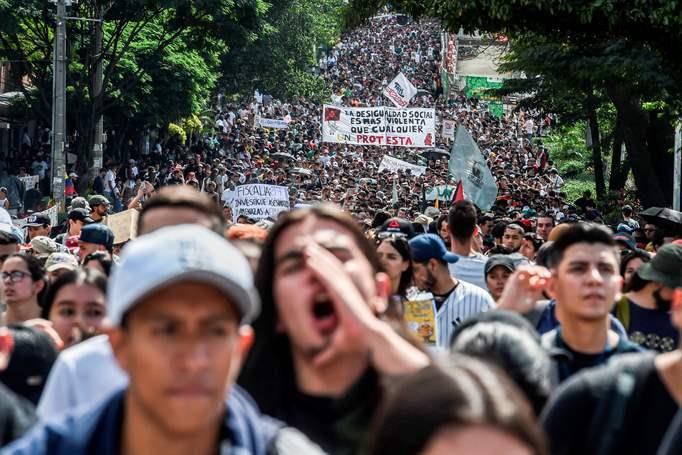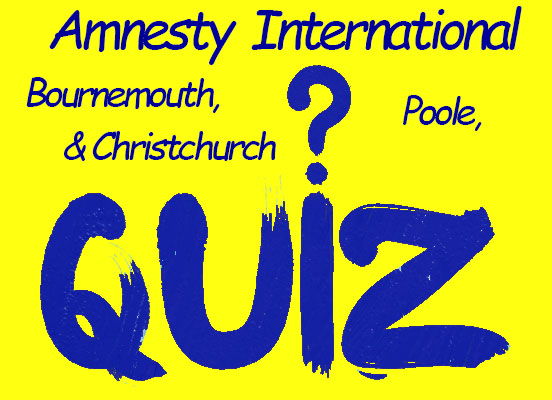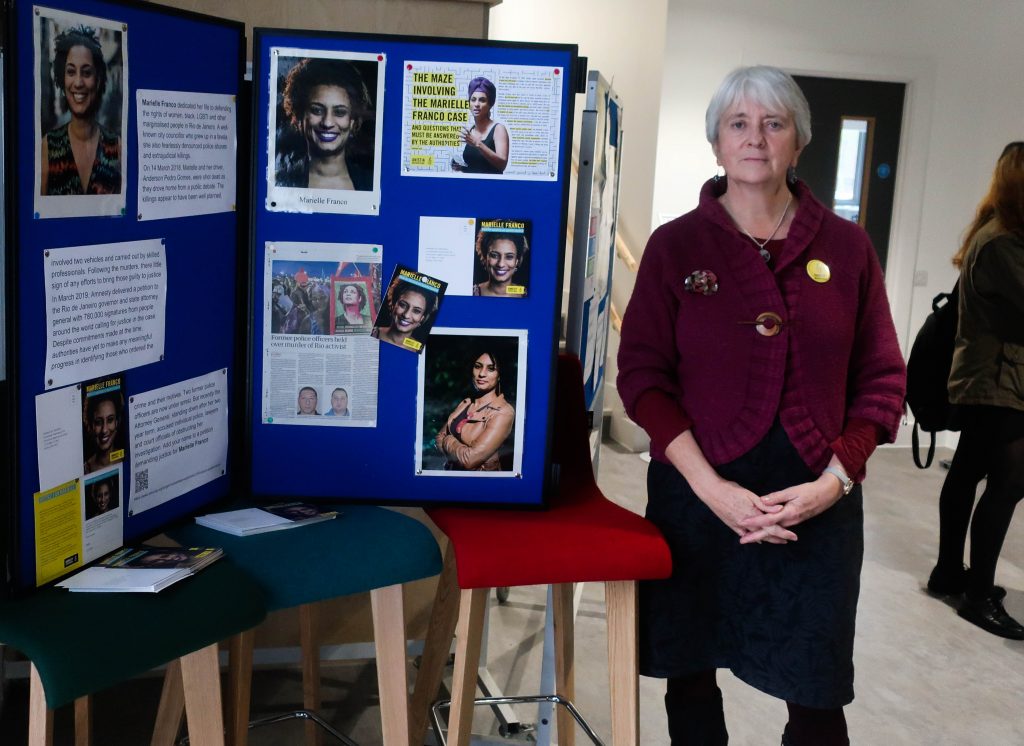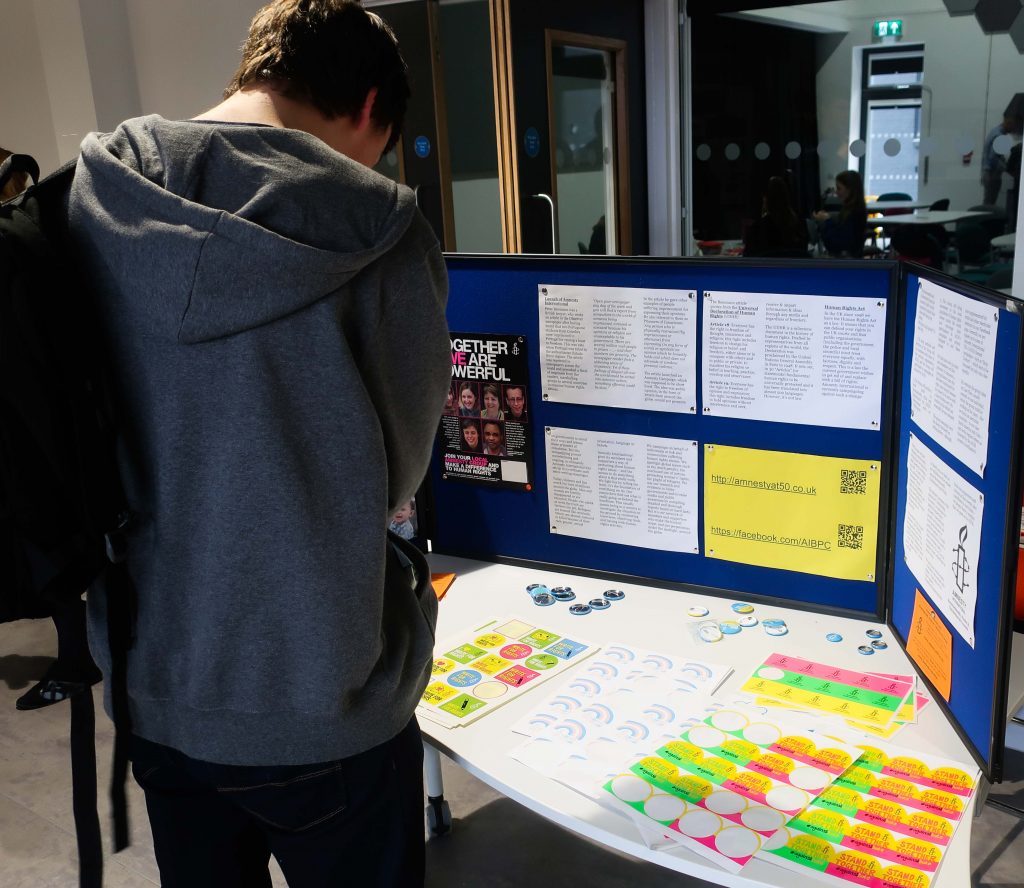|
|
|
|
|
|
Amnesty International Bournemouth Poole Christchurch Group
local news & events Amnesty International group for Bournemouth, Poole & Christchurch
by zarganar
|
|
|
|
|
|
by zarganar
Another eventful month, with calls from Amnesty and others for a response to the human rights violations committed during the anti-government protests in Colombia, Chile, Bolivia and Ecuador. In addition, Amnesty has issued a major report on illegal cattle ranching in the Brazilian Amazon. There are three new Urgent Actions, two on Colombia and one on Venezuela, and a new petition calling for justice for the murder of Marielle Franco.
COLOMBIA
 A nation-wide strike called by disparate social groups protesting social injustices, the faltering peace process, violations of human and environmental rights as well as possible austerity measures by the government of President Duque was met ‘with excessive, disproportionate and unnecessary use of force and arbitrary detentions’, according to Amnesty International. ‘Days before the National Strike, the government already began a campaign to intimidate and frighten those who were planning a peaceful march in support of their rights.’
A nation-wide strike called by disparate social groups protesting social injustices, the faltering peace process, violations of human and environmental rights as well as possible austerity measures by the government of President Duque was met ‘with excessive, disproportionate and unnecessary use of force and arbitrary detentions’, according to Amnesty International. ‘Days before the National Strike, the government already began a campaign to intimidate and frighten those who were planning a peaceful march in support of their rights.’
The ongoing conflict in Chocó has resulted in 2,250 people from indigenous and Afro-descendent communities living under siege from the guerrilla ELN (National Liberation Army) and the paramilitary Gaitanistas Self-Defence Force. They are denying these communities access to food and basic healthcare services and have planted mines in areas where there’s mobile phone coverage. Please respond to Amnesty’s Urgent Action here. (With copies to Mr Antonio José Ardila, Colombian Ambassador to the UK, 3 Hans Crescent London SW1X 0LN.)
The NGO dhColombia has asked the National Protection Unit (UPN) for protection following death threats, theft of sensitive information and surveillance by unknown men outside their homes and offices. To date, the UPN has not responded to their request for protection. dhColombia provides legal support to victims of human rights violations and seeks accountability from prominent military members, public forces and multinational companies. Please respond to Amnesty’s Urgent Action here. (With copies to Mr Antonio José Ardila, Colombian Ambassador to the UK, 3 Hans Crescent London SW1X 0LN.)
The Internal Displacement Monitoring Centre reports that 4,450 people were forcibly displaced in 3 different rural areas by armed groups in the month of November. In Chocó 3,280 people were forcibly displaced by the paramilitary Gaitanistas Self-Defence Force, in Córdoba Department 225 people were forcibly displaced by FARC dissidents, while in Santander Department a further 945 people were displaced due to clashes between the ELN (National Liberation Army) guerrillas and EPL (Popular Liberation Army) guerrillas. [Read more…]
by zarganar
 Thanks to everyone who turned out for latest Amnesty Quiz at the Branksome Liberal Club in Parkstone. 6 teams battled it out and we raised £220. With overseas postage now starting at £1.35 this is a great boost to our funds. And much more fun than doing a street collection!
Thanks to everyone who turned out for latest Amnesty Quiz at the Branksome Liberal Club in Parkstone. 6 teams battled it out and we raised £220. With overseas postage now starting at £1.35 this is a great boost to our funds. And much more fun than doing a street collection!
Thanks to David Rogers for setting the questions and Lucy Freeman for running the raffle. Many thanks to the Liberal Club for providing us with an excellent function room (for free). We will use this venue again as it has capacity to hold double the numbers we had – and has a cheap, easily accessible bar!
If you missed out, below a few questions to have a go at. Answers in the next newsletter.
In 1696 the government of the day imposed a window tax, which led to people bricking up windows to reduce their tax burden. What famous two word saying originated from this tax?
In what decade was the MOT introduced?
Who came to prominence with the hit song Budapest?
Which common pet has the Latin name carassius auratus?
What is the 4th most popular surname in the UK – also name of an occupation (although different spelling)?
Which bank note will Alan Turing be appearing on in 2021?
by zarganar
Over the past decade Amnesty International UK has developed a national programme of Amnesty Speakers who play a key role in delivering human rights workshops, lessons and assemblies in schools across the UK. The South West Speaker Coordinator, and also a member of our group, Tom Wilson organised the first ever UK Schools Human Rights Conference. This was coordinated by Tom and another former Dorset based teacher and AIUK Speaker Peter Radford.
On Tuesday 5th November just under 300 students and teachers gathered at Talbot Heath School. We had a stall to highlight the long standing existence and activism of the group in Bournemouth, Poole and Christchurch. We highlighted our current campaigns, such as justice for Marielle Franco, and the just launched Write 4 Rights.
Students heard first from Peter Radford,, who challenged delegates to realise the power they each have to defend the human rights of others in everyday situations as well as to raise awareness and engage others in challenging injustice. The conference was delighted to hear from Rebecca Ratcliffe, the sister-in-law of Nazanin Zaghari-Ratcliffe currently detained by authorities in Iran. Rebecca shared the trauma of the past three and a half years for their family and the joy at recently being reunited with Nazanin’s daughter Gabriella.
Students were able to choose from a range of workshops on offer on issues such as Climate Change, Modern Slavery, LGBT+ Rights, Women’s Rights and the Refugee Crisis. Headteacher of host school Talbot Heath, Angharad Holloway commented,
“It is more important than ever, during these uncertain times, to stress the importance of universal human rights. I am delighted that Talbot Heath School is hosting this significant regional conference for young people.”
The conference closed with a session led by Tom Wilson giving students the practical tools and strategies to take what they had heard, go back to their schools and make a difference. Harriet, a sixth form student at Talbot Heath commented,
“It was amazing to be surrounded by so many people with the same drive for change. I was educated about issues I had no idea were happening and the speakers showed that everyone has the power to make a difference. I left feeling so motivated and inspired.”
A Year 11 student commented
“I found today very inspirational, and I now think as a school we should promote humans rights more. As we move on I think it’s important that not only our R.A.D group knows how important it is for us globally. As a school I think we should use this opportunity to bring our school together to help the world become a better place by starting with our school.”
Tom and Peter then put on a second Schools Human Rights Conference in Wells the following week. It is hoped such conferences will be appear over the rest of the UK, following on from the success of this launch in the South West. Several of the schools attending in Bournemouth and Wells have offered to host if repeated in 2020. The two of us representing the local group were ourselves both inspired and excited to see such interest in human rights from the delegates.


by zarganar
|
|
|
|